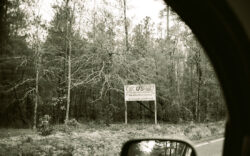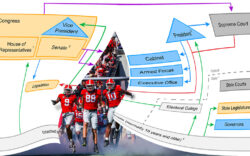The other Big Lie is “Fake News.” The same people who perpetrate the Big Lie about the election also promote the concept of fake news, and they perpetuate it with their own fake news. They’re just the latest in a long line of truth-deniers. In the 1930s Gov. Eugene Talmadge, made uncomfortable by questions he didn’t want to answer, railed against what he called “them lyin’ Atlanta newspapers.”
Because of all the journalists I have known, it rankles to hear somebody toss around the fake term “fake news.” There’s sometimes sloppy news, even erroneous news, but there’s no such thing as fake local news.
You can’t fake local news. Think about it. The public’s business is conducted in meetings, which by law (so far) must be open meetings. Our democracy (so far) is based on citizens (voters) having an accurate understanding of what’s going on. That’s really very simple. In a democracy, citizens can attend public meetings of their government entities and can hang around afterward to ask questions of their government officials. Of course, there are a lot of meetings of different branches of government, some of them lasting many hours, and some of them are streamed or televised, so that citizens can watch from the privacy of their own homes, with beverages.
For as long as our country has existed, we have delegated to journalists the job of attending meetings and asking questions. Covering public meetings and asking questions is long, hard up-close work, usually at a pay grade that the average citizen wouldn’t accept, even if he or she would do the work. Moreover, you can’t just show up at a public meeting and start covering it. You’ve got to know the territory and the players. You’ve got to know who’s who and what’s what, and that takes training and experience. You’ve got to know a lot about the many areas of government and politics, and you need to know human nature, too. And you’ve got to be able to assimilate a lot of information and pay attention to details and put two and two together. You’ve got to be accurate, and you’ve got to be honest. You’re not covering these public officials on a one-shot basis. You’ll be covering them again next week and the weeks after. If you get something wrong, they’ll let you know about it. And if you’re not completely honest with them (even when they’re not completely honest with you), you can lose their respect and their confidence that you’re dealing fairly with them.
Although local newspapers have closed down all over the country, journalists still explain the government to the citizens, using training, skills and knowledge gained over many years. There is nothing fake about what local journalists do, in spite of the cheap-shot artists who belittle their work because they’re threatened by it. Believe me, there is nothing more real than local government journalism. Its practitioners are face-to-face with their subjects, and there is no room for error or duplicity. Local government coverage is tough, grueling and demanding, though there can be a grim satisfaction in piecing together a story from reluctant sources, sometimes necessitating open records requests or even lawsuits.
Those who shout fake news are undermining our democracy as surely as those who refuse to accept the results of cleanly won elections. You can no more fake a local election than you can fake local news. Local elections, like local government, are conducted by local people we know, and they do it out in the open, according to the rulebook—and, for that matter, all elections are local.
The term” fake news” like “rigged elections” is absurd on the local level, but unfortunately, the politics of the absurd is eating away at the foundation of our democracy. Those who shout “fake news” are those who practice it. Ol’ Gene was ahead of his time, and it wasn’t the Atlanta papers doing the lying.
Like what you just read? Support Flagpole by making a donation today. Every dollar you give helps fund our ongoing mission to provide Athens with quality, independent journalism.










